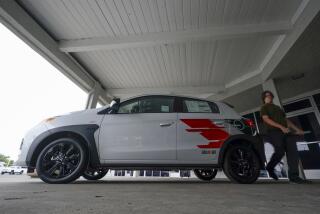Hard Times Force Car Salesman to ‘Work Smarter’
- Share via
He’s a car salesman caught in the throes of one of the nation’s worst auto industry slumps, but Godwin Hui refuses to see the down side of things.
“It’s not that bad,” the trim, boyish-looking Acura employee said on a recent Saturday, seemingly unfazed by the fact that the Main Street showroom in Alhambra is deserted, save for a few bored-looking salespeople milling around.
“It’s all in the head,” Hui reasoned, as if delivering a sales pitch to a penny-pinching customer. “You’ve got to have a good attitude.”
To drive home his point, Hui showed a visitor his April 30 paycheck, posting a year-to-date gross income of $19,101.37--indicating that if things don’t change, he’ll make a decent $57,000-plus this year, before taxes.
The outlook was bleaker late last year, before the Persian Gulf War, Hui says. To save money, he quit driving to work for a while and asked his brother to shuttle him around.
Still, like many others in his profession, where income depends largely on sales commissions, Hui is bracing for what could be the further decline of a sagging auto market. The 30-year-old Chinese-American bachelor is toning down his once-comfortable lifestyle, trimming dollars and frills from his budget and working twice as hard as he used to.
No more $100 dinners after work with friends, a luxury that had Hui dishing out $400 a month at Monterey Park’s expensive Chinese seafood palaces. Now, Hui said, he spends about half that eating out.
And no more $500 custom-tailored suits. Before the recession, Hui was buying at least one every couple of months.
“For three months, I haven’t bought anything,” he said. “This is unnecessary. I don’t think I need that many. I already have 10 to 20 suits.”
Hui, who left Hong Kong for California six years ago, decided to enter the car business in 1989, after losing money on a Chinese restaurant in Desert Hot Springs. That was a joint venture with a group of friends, and it flopped a few years after it opened. Before that, he had been earning minimum wage as a waiter in a Chinese restaurant in Rowland Heights.
“My friend told me (car sales) is a good business,” Hui recalled. “I was doubtful. I didn’t know I had the ability to do it.”
Although he is single, Hui has a family to support. His parents and grandmother live with him in a three-bedroom, two-bath house in Baldwin Park that Hui rents for $800 a month. He spends $400 a month on food for the four. Luckily, he said, their medical bills are minimal.
Moving his family to Baldwin Park 18 months ago made good economic sense at the time, but he said the rent is too expensive during these uncertain times. At the end of this month, Hui plans to move the family to a $600-a-month Alhambra apartment about half the size of the house. It has only two bedrooms and one bath, so Hui will sleep in the living room.
But the cheaper, smaller apartment has its good points as well: It’s just around the corner from the Acura dealership and is closer to the western San Gabriel Valley’s Chinese supermarkets. That means his gas and car maintenance bills will go down.
Even seemingly affordable expenses haven’t escaped Hui’s personal budget ax. At the end of each sale, he used to give buyers fancy key chains emblazoned with the Acura logo. At $5 to $7 apiece, they are no cheap trinkets, and Hui has to buy them himself. Now, he only gives them to people who ask.
There are some costs Hui can’t avoid, such as the $350-a-month payments on a new Acura Integra LS he bought last September for his younger sister to use. (Hui himself drives a 1982 Toyota Celica.)
And although his monthly phone bill can reach $300, Hui said he has no intention of lowering it. The telephone, he explained, is the mainstay of any good car salesman--especially during a recession.
At home on his one day off, Hui worked the phones, calling old customers to suggest it’s time for a new car, or to ask whether their friends are looking to buy. He sometimes makes “cold calls” by thumbing through the white pages and dialing phone numbers in affluent San Marino or upscale Pasadena neighborhoods to make a pitch.
These methods of hunting down potential customers are becoming increasingly important, Hui said, because there are not as many “ups,” a salesperson’s lingo for drop-in customers.
“I’m making more appointments instead of just waiting” for people to walk in to the dealership, Hui said.
At a time when some colleagues are considering leaving the business for something more stable, Hui is working longer hours to make the same number of sales. He used to be on a 6 1/2-hour, five-day workweek; now he’s on a self-imposed 10-hour, six-day schedule--almost twice as long as before.
And he never takes weekends off.
“You have to work harder and be smarter,” Hui said. “There’s a big difference between a top salesman and just a normal salesman.”
His efforts are beginning to pay off. At 8:30 p.m. on Saturday, near the end of a 12-hour workday, Hui did the seemingly impossible: He sold a five-speed Acura Integra for only $500 below the sticker price.
“It’s all in the head,” he said.
More to Read
Inside the business of entertainment
The Wide Shot brings you news, analysis and insights on everything from streaming wars to production — and what it all means for the future.
You may occasionally receive promotional content from the Los Angeles Times.










